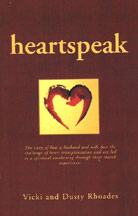 Between the Covers
Between the Covers
A Change of Heart
A decade ago, Vicki Rhoades needed a new heart. She’s lived to write, with her husband, about how the crisis transformed their lives.
by Sara Ebenreck Leeland
Vicki Rhoades was 42 when her heart began to send her clear distress signals. One rainy spring morning she woke up late, grabbed half a donut, and ran out into the rain with her mind on work at the Southern Community Center in Lusby, Maryland. It was about 30 miles, 40 minutes, to her office.
As she describes it, her legs suddenly stopped working, and she landed on the driveway with a thud. “A newspaper headline popped into my mind,” she remembers. ‘Woman dies in driveway sitting yoga style in the rain.”
In the next weeks, Rhoades would have more emotional crash-landings, as her genetic heart disease was diagnosed. She watched her own heartbeat on a video screen and heard a doctor describe her disease as incurable. She listened as the doctors told her that her daughter has inherited the same disease. Then, after four years of trying every possible medical aid, she heard the verdict: She needed to add herself to the long list of people waiting for a heart transplant.
1994
 So began the story of the heart transplant, told in Heartspeak by Vicki and Dusty Rhoades of Sunderland, in Calvert County.
So began the story of the heart transplant, told in Heartspeak by Vicki and Dusty Rhoades of Sunderland, in Calvert County.
You’ll end the book knowing a lot more about heart surgery. But that’s just the setting for the deeper story of how Vicki and her husband Dusty’s lives were transformed as they walked this hard road together.
Chapters in the book alternate authors, so events are seen from two points of view. When this story began, Vicki was a Navy wife and a mother of two teenagers, a creative instigator of programs for senior citizens and a recent fine arts graduate of St. Mary’s College of Maryland. Dusty, a graduate of the U.S. Naval Academy with 25 years experience as a naval aviator, directed the Naval Test Pilot School in Lexington Park. Vicki felt her way through every step; Dusty was a master of how to get whatever-it-was done well, now!
But the essential part of a heart-transplant process is life-and-death chance. Someone has to die for a heart to become available, and that someone has to be a match in blood type and body size. There’s just no way to organize this.
Vicki’s condition meant that she waited the last few weeks in the hospital in Fairfax, Virginia. She met others on the wait-list, organ recipients and also donor families whose relative had died. The way one person’s death can be part of another’s healing became emotionally powerful to her.
Meanwhile, Dusty worked his long hours at the Navy base, kept the horses and dogs fed at home and spent most of his other moments on the road to Fairfax so he could share dinnertime with Vicki.
Before she left home, Vicki wrote to her family, just in case she didn’t make it. Dusty saw the letters, but couldn’t think about all they implied.
On April 21, 1994, their wait ended. A donor heart was waiting at the National Institutes of Health. Dusty and Vicki had only five minutes together after making the decision for surgery. As Dusty wrote later, he’d risked his own life many times as a navy aviator. He’d flown an emergency rescue mission to get fuel to other pilots over a wintry Sea of Japan; anyone who went down in that weather would die in the frigid water in minutes. By the time he found the two low-fuel planes, there was barely enough fuel to transfer to get all three planes back to the Navy carrier. That was chancy, but they all made it.
And Vicki, too, made it, surviving her surgery.
2004
A decade later, there’s time to think back on it.
“The important thing is to focus on how we live,” Dusty wrote in a concluding chapter on what they’ve learned at the brink of life and death. “Each time we touch other people in our lives, we leave something of ourselves.”
Vicki’s answer jumps off from there. “The awareness that my donor lives on through me,” she said, beginning a sentence that her husband completed. “We began to feel a sense of connection with all of life,” he said.
Their quick senses of humor surely helped their sanity. Vicki still laughs as she recounts how shortly before surgery, a hospital intern came in to check her heart. He pushed a button on her bed; the next thing she knew she was being folded into a V-shape as both ends of the bed simultaneously lifted and closed up. Staff came rushing.
Vicki and Dusty emerged as a pair of contemplative activists. Both are on the board of Project Echo, the homeless shelter in Prince Frederick. In their case, on the board includes providing food and assistance along with helping organize fundraisers. They act as mediators for the St. Mary’s (and Calvert) Mediation Center, a nonprofit that helps people resolve issues outside of court. They are peace-and-justice advocates in their Quaker Meeting, the Patuxent Friends Meeting in Lusby. They speak regularly as part of the metropolitan network of organ donors/recipients.
A new heart, Vicki says, has not only saved but also enlarged her life: “I feel I’m part of a world community, a community interconnected through love and service.”
Heartspeak by Vicki and Dusty Rhoades, published by Xlibris at www.Xlibris.com ($18.69) and at Main Street Gallery in Prince Frederick.
to the top

 So began the story of the heart transplant, told in Heartspeak by Vicki and Dusty Rhoades of Sunderland, in Calvert County.
So began the story of the heart transplant, told in Heartspeak by Vicki and Dusty Rhoades of Sunderland, in Calvert County.